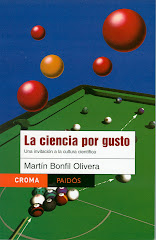Published in Milenio Diario, January 6, 2010
Every time that I go out on vacations I take with me something good to read. This year's end was no exception: I chose the most recent work of my friend Marcelino Cereijido, Mexican-argentine researcher at Cinvestav: Science as calamity, an assay about science illiteracy and its effects (Gedisa, 2009).
This is not the first time I enjoy his excellent prose and even better ideas. Several trips to the beach have been made more enjoyable thanks to other little jewels from him: Brainless science, double craziness (Siglo XXI, 1994, where he advices a young person about the challenges, difficulties and disappointments that awaits her if he or she decides to be a scientist in a third world country), Why we don't have science, (Siglo XXI, 1997, where he presents the well-sustained hypothesis that the culture of Latin-American countries, with their Hispanic-Portuguese catholic influence, is one of the fundamental causes that our countries do not understand, support, nor, most importantly, develop or take advantage of modern science), and Houssay's nape (Fondo de Cultura Económica, 1990, an intimate and penetrating autobiographic account that tells his experience when becoming a scientist –he even studied with Nobel awarded professors– to later be persecuted, imprisoned and exiled by the catholic obscurantism of the Argentine military dictatorship.
The book can, in my opinion, be divided in two sections. The first presents a view of science, its history and the current situation of scientific illiteracy. The second part –which I considered more convincing and stimulating- raises the grave problem that such illiteracy imposes the third world, placing it at disadvantage in front of the first world, and dares to make some proposal outlines for its solution.
Cereijido states that scientific illiteracy in non-developed countries consists not only in not having science of their own, but in lacking a culture that would allow them to even realize this, and to value the heavy problem of this lack. But the really alarming thing is to realize, as demonstrated in the book, that there has always been a strategy of the first world to guarantee that the third world keeps being underdeveloped. This asymmetry is what today is really threatening global equilibrium, so drastic measures need to be taken to fight it… Only we'll have to do it ourselves. This is the base for his stimulating proposals. Now the task will be to spread them, discuss them and put them in practice… Count me in.
One complaint, though: the book, unfortunately, like many books from Ibero-American editorials, is very badly edited. Commas before verbs, or incorrectly added into phrases, which change their meaning; numerous references that do not appear in the bibliography, repetitions and, even, some sloppyness in the way the text is organized; not author's mistakes, but the editor's, from whom we would expect a more profound and professional work (because is the editorial house's, not the author's, responsibility to take care of all the details, editorial as well as the coherence and clarity of the text).
Summarizing: an enjoyable and intelligent book, but also an important and timely one. Even urgent. I hope every person that has to do with science in Latin American countries (researchers, students, government people, politics… citizens!) reads it.
(translated by Adrián Robles Benavides)
To receive Science for pleasure weekly
in your email, subscribe here!






No comments:
Post a Comment